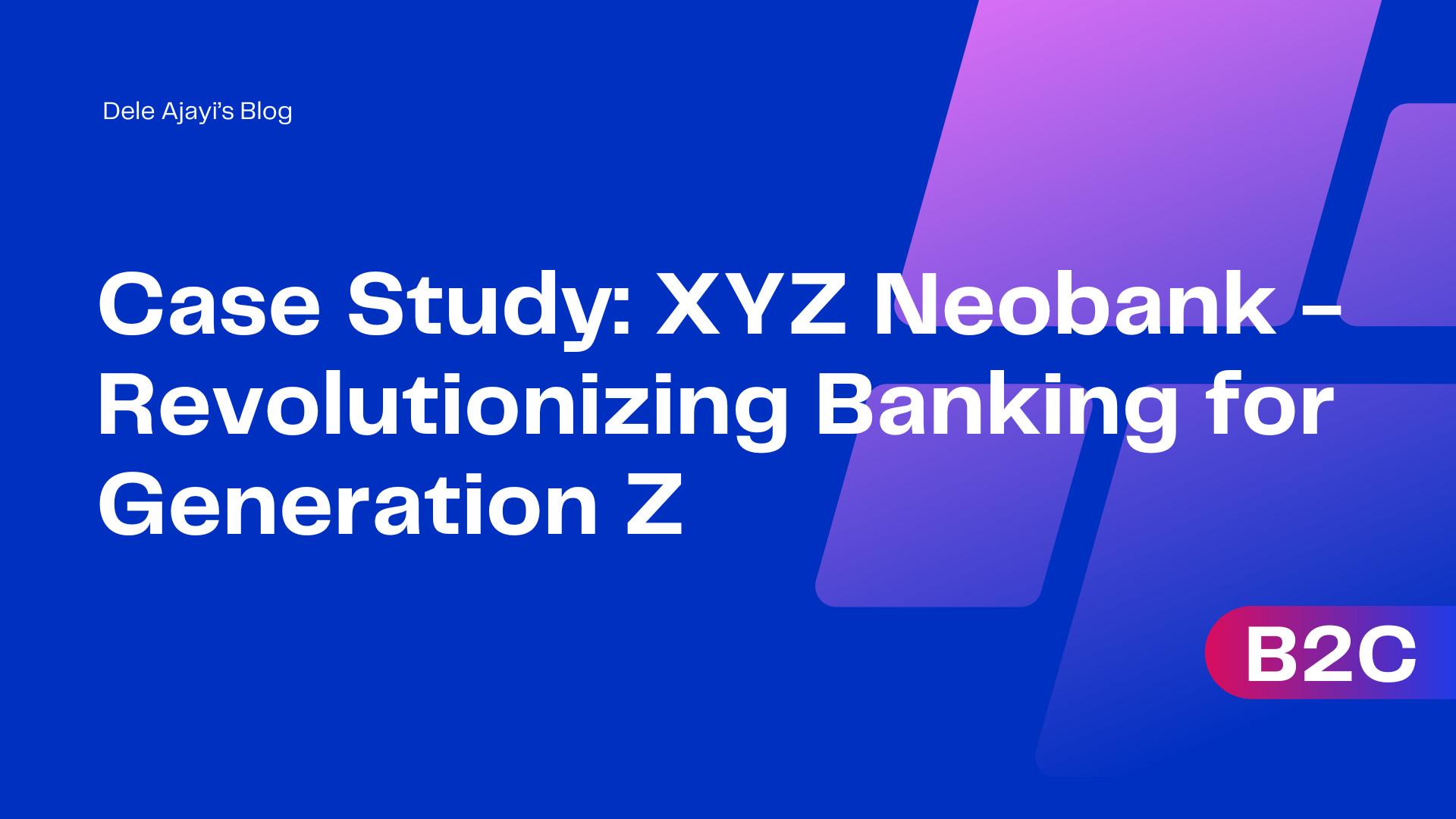Case Study: XYZ Neobank - Revolutionizing Banking for Generation Z
 Dele Ajayi
Dele Ajayi
Introduction 👋:
In a world evolving at fast pace, XYZ Neobank emerges as a beacon of innovation, tailored exclusively for Generation Z (Gen Z). Born out of a vision to simplify banking for the digital natives, XYZ sets out to redefine the banking experience, providing financial services that resonate with the unique needs and preferences of the Gen Z demographic.
User Persona: Meet Emma, the Trailblazing Gen Z 👧:
Background: Emma, a 21-year-old college student majoring in digital marketing, is the epitome of the XYZ Neobank target audience. She's tech-savvy, values seamless digital experiences, and seeks financial solutions that align with her dynamic lifestyle.
Pain Points:
Traditional banking feels outdated and cumbersome.
Lack of personalized financial tools for budgeting and savings.
Limited access to real-time financial insights.
Problem 😌:
Generation Z faces a disconnection with traditional banking systems, marked by rigid structures and outdated technologies. XYZ Neobank identifies the need to bridge this gap, providing a banking solution that resonates with the preferences and expectations of the digital-native Gen Z.
Solution ✅:
XYZ Neobank introduces a groundbreaking platform, blending cutting-edge technology with a user-centric approach to meet the distinct needs of Generation Z. The solution encompasses:
Product Features:
Mobile-First Interface: An intuitive app that makes banking easy, accessible, and enjoyable.
Personalized Financial Insights: AI-driven tools that analyze spending patterns, providing tailored advice for budgeting and savings.
Savings and Loan: Access high interest savings option with multiple options such as; flexible savings and fixed savings. Also, get access to low interest loan in seconds.
Zero-Fee Transactions: Eliminating traditional banking fees to empower Gen Z to manage their money without unnecessary costs.
Cryptocurrency Integration: Addressing the growing interest in digital assets, XYZ allows seamless management of traditional and digital currencies in one place.
Social Banking Features: Enabling users like Emma to split bills, share expenses, and manage group finances effortlessly.
Metrics and KPIs 📊:
User Acquisition and Engagement:
Number of New Users: The rate at which new users are signing up.
Active User Count: The number of users actively using the app within a specific time frame.
User Retention Rate: Percentage of users who continue (coming back to use the app over time.
Transaction and Financial Metrics:
Transaction Volume: The total value of transactions processed through the app.
Average Transaction Value: The average value of each transaction.
Transaction Success Rate: Percentage of transactions that are successfully completed without errors.
Security Metrics:
Fraud Rate: The percentage of transactions flagged as potentially fraudulent.
Security Incidents: Number of security incidents or breaches reported.
Operational Performance:
App Uptime/Downtime: The percentage of time the app is available and accessible to users.
Latency: Time taken for the app to respond to user interactions.
Error Rate: Percentage of user interactions that result in errors or failures.
Customer Support:
Response Time: Average time taken to respond to customer support inquiries.
Customer Satisfaction (CSAT): Measure of customer satisfaction with the app's services.
Issue Resolution Rate: Percentage of customer issues resolved within a specified time.
Compliance and Regulatory Metrics:
Compliance Score: Measurement of adherence to financial regulations and industry standards.
Regulatory Violations: Number of instances where the app fails to comply with regulations.
Financial Health:
Net Profit Margin: The percentage of revenue that translates into profit.
Cost per Transaction: Cost incurred for processing each transaction.
Technology Infrastructure:
Server Response Time: Time taken for servers to respond to requests.
Scalability Metrics: Ability of the infrastructure to scale with increased user load.
App Performance:
App Load Time: Time taken for the app to load on user devices.
App Crash Rate: Percentage of app sessions that result in a crash.
Market Metrics:
Market Share: Percentage of the neobank market captured by the app.
Customer Acquisition Cost (CAC): Cost associated with acquiring a new customer.
Roadmap 🗺️ : Quarterly Development Plan
Quarter 1: Foundation
Launch mobile app with core banking features.
Implement onboarding enhancements for a seamless user experience.
Quarter 2: Personalization
Introduce AI-driven financial insights and personalized recommendations.
Test and roll out initial cryptocurrency integration.
Quarter 3: Community Building
Launch social banking features.
Initiate marketing campaigns targeting Gen Z influencers.
Quarter 4: Optimization
Conduct user feedback sessions for continuous improvement.
Implement advanced security measures and fraud detection.
Product Lifecycle Phases ♻️:
Introduction: Launch of XYZ Neobank, establishing a presence in the market.
Growth: Expanding user base, adding new features, and gaining market traction.
Maturity: Optimization and fine-tuning based on user feedback, solidifying market position.
Decline or Evolution: Adapting to evolving user needs, possibly introducing new products or services.
In summary, XYZ Neobank presents a groundbreaking solution, creating a seamless banking experience for Generation Z. With a user-centric approach, innovative features, and a strategic development roadmap, XYZ Neobank is poised to revolutionize the banking landscape for the digital-native generation.
Subscribe to my newsletter
Read articles from Dele Ajayi directly inside your inbox. Subscribe to the newsletter, and don't miss out.
Written by
